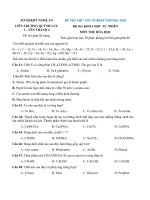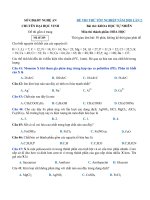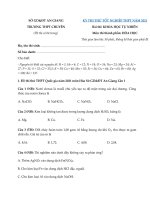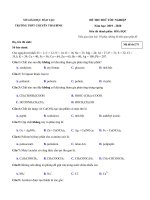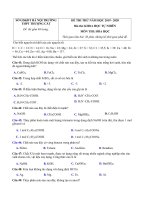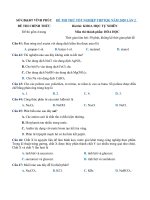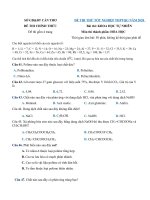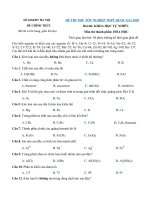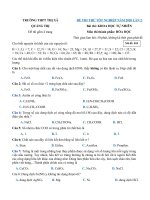Tải Đề thi thử THPT Quốc Gia môn tiếng Anh năm 2020 số 29 - Đề thi tốt nghiệp THPT 2020 môn Anh có đáp án
Bạn đang xem bản rút gọn của tài liệu. Xem và tải ngay bản đầy đủ của tài liệu tại đây (151.64 KB, 10 trang )
<span class='text_page_counter'>(1)</span><div class='page_container' data-page=1>
<b>ĐỀ THI THỬ THPTQG MÔN TIẾNG ANH</b>
<b>NĂM 2020 CÓ ĐÁP ÁN</b>
<b>Mark the letter A, B, C, or D on your answer sheet to indicate the word whose</b>
<b>underlined part differs from the other three in pronunciation in each of the</b>
<b>following questions</b>
<b>Question 1: A. attention B. situation</b> <b>C. instance</b> <b>D. obtain</b>
<b>Question 2: A. educate</b> <b>B. concentrate</b> <b>C. communicate</b> <b>D. appropriate</b>
<i><b>Mark the letter A, B, C, or 19 on your answer sheet to indicate the word that differs</b></i>
<i><b>from the other three in the position of primary stress in each of the following</b></i>
<i><b>questions</b></i>
<b>Question 3: A. tragic</b> <b>B. professor</b> <b>C. mature</b> <b>D. degree</b>
<b>Question 4: A. atomic</b> <b>B. obviously</b> <b>C. informal</b> <b>D. approaching</b>
<b>Mark the letter A, B, C, or I) on your answer sheet to indicate the correct answer to</b>
<b>each of the following questions</b>
<b>Question 5: You should </b> more attention to what your teacher explains.
<b>A.</b>make <b>B. pay</b> <b>C. get</b> <b>D. set</b>
<b>Question 6: The lecturer explained the problem very clearly and is always </b> in
response to questions.
<b>A. attention</b> <b>B. attentive</b> <b>C. attentively</b> <b>D. attentiveness</b>
<b>Question 7; Jack's mother ______a birthday cake with seventeen lighted candles on it.</b>
<b>A. brought out</b> <b>B. showed off</b> C. turned up <b>D. took over</b>
<b>Question 8: 1 have never seen such a beautiful dress </b> _ you before.
<b>A. of</b> <b>B. on</b> <b>C. for</b> <b>D. in</b>
<b>Question 9: When you catch someone's </b> you do something to attract his attention
so that you can talk to him.
<b>A. head</b> <b>B. hand</b> <b>C. eye</b> <b>D. ear</b>
<b>Question 10: The teacher recommended that Torn _____ his composition as soon as possible.</b>
</div>
<span class='text_page_counter'>(2)</span><div class='page_container' data-page=2>
<b>C. should finish to write</b> <b>D. finishes writing</b>
<b>Question 11: Jane is going to go abroad next month and she's having a ______ party on</b>
Sunday.
<b>A. birthday</b> <b>B. farewell</b> <b>C. wedding</b> <b>D. anniversary</b>
<b>Question 12: A whistle is the </b> for the football players to begin the match.
<b>A. communication B. instance</b> C. attention <b>D. signal</b>
<b>Question 13: advised on what and how to prepare for the interview, he might have got</b>
the job.
<b>A. Had he been</b> <b>B. If he had</b>
<b>C. Unless he had been</b> <b>D. Were he to be</b>
<b>Question 14: John lost the </b> bicycle he bought last week and his parents were very
angry with his carelessness.
<b>A. new beautiful blue japanses</b> <b>B. beautiful blue Japanese new</b>
<b>C. beautiful new blue Japanese</b> <b>D. Japanese beautiful new blue</b>
<b>Question 15: Each of the guests </b> a bunch of flowers.
<b>A. are given</b> <b>B. is given</b> <b>C. were given</b> <b>D. give</b>
<b>Question 16: Let's go to the beach this weekend, </b> ?
<b>A. do we</b> <b>B. shall we</b> <b>C. will we</b> <b>D. don't we</b>
<b>Mark the letter A, B, C, or I) on your answer sheet to indicate the word(s) CLOSEST in</b>
<b>meaning to the underlined word (s) in each of the following questions.</b>
<b>Question 17: This is the instance where big, obvious non-verbal signals are appropriate.</b>
<b>A. situation.</b> <b>B. attention</b> <b>C. place</b> <b>D. matter</b>
<b>Question 18: These anniversaries mark the milestones of a happy and lasting relationship</b>
between married couples.
<b>A. signs</b> <b>B. achievements</b> <b>C. landmarks</b> <b>D. progresses</b>
<b>Mark the letter A, B, C', or D on your answer sheet to indicate the word(s)</b>
<b>OPPOSITE in meaning to the underlined word(s) in each of the following questions.</b>
</div>
<span class='text_page_counter'>(3)</span><div class='page_container' data-page=3>
career which was impossible for a woman at that time.
<b>A. kept</b> <b>B. had</b> <b>C. abandoned</b> <b>D. deleted</b>
<b>Question 20: After the tragic death of Pierre Curie in 1906, she not only took charge of</b>
educating her two children but also took the position which her husband had finally
obtained at the Sorbonne.
<b>A. brilliant</b> <b>B. lovely</b> <b>C. fascinating</b> <b>D. happy</b>
<b>Mark the letter A, B, C, or D on your answer sheet to indicate the sentence that best</b>
<b>completes each of the following exchanges.</b>
<b>Question 21: - “I passed the TOEFL test, Mom.” - “ </b> ”
<b>A. All right</b> <b>B. Well done</b> <b>C. Good luck</b> <b>D. Thank you</b>
<b>Question 22: - Roger: "Wow! You look terrific in that new dress!" - Tina: "_ _”</b>
<b>A. Oh, what a pity!</b> <b>B. I'm afraid so!</b>
<b>C. Thank you. I'm glad you think so,</b> <b>D. Why dare you say so?</b>
<b>Read the following passage and mark the letter A, B, C, or D on your answer sheet to</b>
<b>indicate the correct word or phrase that best fits each of the numbered blanks from 23</b>
<b>to 27.</b>
<b>ALFRED NOBEL</b>
Alfred Nobel was born on October 21, 1833 in Sweden. His important invention was
dynamite - a powerful (23)_____. This dynamite business made him a very rich man.
One day, Alfred Nobel read about his death in a newspaper. In fact, it was his
brother's death. The mass media (24)_ him a saleman of death, "The dynamite
king". Nobel was very
upset. He had invented dynamite to save l ives - l ives ( 25 ) were lost
because other explosives were dangerous to use. He hated violence and war. And he did
not like the world to think of him as a man of war.
</div>
<span class='text_page_counter'>(4)</span><div class='page_container' data-page=4>
changed the way the world thought of him. He was remembered the way he wanted:
Alfred Nobel, man of peace.
<i>( />
<b>Question 23: A. explode B. explosive</b> <b>C. explosion</b> <b>D. exploded</b>
<b>Question 24: A. called</b> <b>B. regarded</b> <b>C. reminded</b> <b>D.</b>
remembered
<b>Question 25: A. who</b> <b>B. what</b> <b>C. that</b> <b>D. where</b>
<b>Question 26: A. of</b> <b>B. to</b> <b>C. at</b> <b>D. up</b>
<b>Question 27: A. Finally</b> <b>B. At the end</b> <b>C. Thus</b> <b>D. Hence</b>
<b>Read the following passage and mark the letter A, B, C, or D on your answer sheet to</b>
<b>indicate the correct answer to each of the questions from 28 to 35.</b>
In America, when dining, people consider it rude for a guest or dining partner to
belch or burp, eat with an open mouth, smack, or lick your fingers. Napkins,
generally provided are available at every meal and should be placed in one's lap and
then used throughout the meal to clean one's fingers and mouth.
It is acceptable to refuse additional servings of food by saying "No, thank you"
and the host or hostess will not be insulted if you do so. Similarly, if you leave a small
<b>amount of uneaten food on your plate at a restaurant or in a home, it is not considered an</b>
insult. If you eat everything on the plate, a host or hostess may possibly feel that they
have not prepared enough food and might be embarrassed. People in the United States
serve and eat food with either hand, but never take food from a communal serving dish
with their hands. Generally, a serving utensil is used.
Americans typically use forks, spoons and knives to eat, but there are some types of
foods that are acceptable to eat with one's fingers, like sandwiches or pizza. When in
doubt, look to see what others are doing. In formal dining situations, if you wonder
whether or not it is acceptable to begin eating, you should wait until the oldest woman (or
oldest man if no women are present) begins to eat. When eating, do not pick up the bowl
or plate from the table to hold underneath your mouth, Even noodles, soup, and rice are
eaten with the plate or bowl remaining on the table. When consuming soup and hot liquids,
it is considered impolite to slurp - do not do this. When consuming noodles, twirl them
around your fork and then put it in your mouth.
</div>
<span class='text_page_counter'>(5)</span><div class='page_container' data-page=5>
taking a woman for coffee, versus tacos, versus a fancy dinner, versus for drinks at
11:30pm, all signal many different things to them. So, the date is a -test- of many. Paying
is just as important as where you take her, and how late. So, don't assume she is just trying
to get a "free meal". Most girls aren't. Also, if you are going out with a friend to eat,
almost always, the bill is expected to be split in half, or each person pays for themselves.
If you are eating in a restaurant, you will be expected to add a 15 to 20 % tip for the
server to your bill. In America, wait staff might occasionally stop by your table to ask
how your meal is, which is considered good service. They will also bring you your check
when it seems reasonable that you are finished with your meal, however this is not
necessarily an indication that you must leave right away (Do not be too embarrassed to ask
for the check either waiters and waitresses cannot read minds.) Take your time to finish
your meal, and unless there is a line of people waiting at the door, it is not considered
<b>rude to linger at your table for as long as you like.</b>
<i>(Source:ht</i><b>tps://www.tripadvisor.com </b>/)
<b>Question 28: Which of the following could be the best title of the passage?</b>
<b>A.</b>What should we do when being invited to the American's dinner?
<b>B.</b>Table etiquette in America.
<b>C.</b>Polite behavior at American's restaurants.
<b>D.</b>What is acceptable in dining etiquette in America?
<b>Question 29: According to the passage, what action may make the American unpleasant?</b>
<b>A.</b>Refusing the supplementary food they serve.
<b>B.</b>Leaving the left-overs on the plate.
<b>C.</b>Eating food with the guests' hands.
<b>D.</b>Cleaning the food on the fingers by the tongue.
<b>Question 30: What sentence is NOT stated in the passage?</b>
<b>A.</b>In formal dinners, the eldest often eat first.
<b>B.</b>In America, the dishes are expected to remain on the table.
<b>C.</b>Food is sometimes delivered from the communal serving dish with people's hands.
<b>D.</b>It is not courteous to slurp when eating soup.
<b>Question 31: The word "it" in paragraph 3 refers to </b> .
</div>
<span class='text_page_counter'>(6)</span><div class='page_container' data-page=6>
<b>Question 32: What could the word "gauge" in paragraph 4 best be replaced by?</b>
<b>A. determine</b> <b>B. impress</b> <b>C. express</b> <b>D. estimate</b>
<b>Question 33: When will the bill be divided for the people having the meal?</b>
<b>A.</b>When a man is having a date with a woman.
<b>B.</b>When people are having meals with their friends.
<b>C.</b>When people are eating with the elderly.
<b>D.</b>When a girl is testing a boy.
<b>Question 34: The word "linger" in the last paragraph is closest in meaning to______.</b>
<b>A. appear</b> B. arrange <b>C. reserve</b> <b>D. remain</b>
<b>Question 35: Which of the following can he inferred from the passage?</b>
<b>A.</b>It is impolite if you give extra money for the waiter.
<b>B.</b>Whenever you receive your bill, you should think of leaving soon.
<b>C.</b>Paying meals for another may insult them.
<b>D.</b>Imitating others if you are not sure what to do at the meal is a good idea.
<b>Read the following passage and mark the letter A, 11, C, or D on your answer sheet to</b>
<b>indicate the correct answer to each of the questions from 36 to 42.</b>
Christina and James met in college and have been dating for more than five
years. For the past two years, they have been living together in a condo they
purchased jointly. While Christina and James were confident in their decision to enter
into a commitment like a 20-year mortgage, they are unsure if they want to enter into
marriage. The couple had many discussions about marriage and decided that it just
did not seem necessary. Wasn't it only a piece of paper? And didn't half of all
marriages end in divorce?
</div>
<span class='text_page_counter'>(7)</span><div class='page_container' data-page=7>
remarried and had a baby with his new wife.
Recently, Christina and James have been thinking about having children and the
subject of marriage has resurfaced. Christina likes the idea of her children growing up
<b>in a traditional family; while James is concerned about possible marital problems</b>
down the road and negative consequences for the children should that occur. When
they shared these concerns with their parents, James's mom was adamant that the
couple should get married. Despite having been divorced and having a live-in
boyfriend of 15 years, she believes that children are better off when their parents are
married. Christina's mom believes that the couple should do whatever they want but
adds that it would "be nice" if they wed. Christina and James's friends told them,
married or not married; they would still be a family.
<i>( />
<b>Question 36: Why did Christina and James suppose that marriage was unnecessary?</b>
Because
_
<b>A.</b>It was only a piece of paper.
<b>B.</b>Half of all marriages ended in divorce.
<b>C.</b>Neither of them had seen much success with marriage while growing up.
<b>D.</b>They led to an independent life.
<b>Question 37: Which can be used as an antonym of the word "maternal"?</b>
<b>A. relative</b> <b>B. bloody</b> <b>C. close</b> <b>D. paternal</b>
<b>Question 38: According to the paragraph 2, which of the following statements is TRUE?</b>
<b>A.</b>Christina lived with her parents until she left for college.
<b>B.</b>James was brought up by his father and his new wife.
<b>C.</b>Both James and Christina grew up in broken families.
<b>D.</b>James lived with his mother and her boyfriend for a year.
<b>Question 39: Which of the following could best replace the word "traditional" ?</b>
<b>A. old-fashioned</b> <b>B. customary</b> <b>C. antique</b> <b>D. ancient</b>
<b>Question 40: Why have Christina and James mentioned the subject of marriage again?</b>
<b>A.</b>They have been thinking about having children.
</div>
<span class='text_page_counter'>(8)</span><div class='page_container' data-page=8>
<b>C.</b>They have been living together for a long time.
<b>D.</b> James is concerned about possible marital problems down the road and negative
consequences for the children should that occur.
<b>Question 41: What is the advice of the couple's parents?</b>
<b>A.</b>Married or not married, they would still be a family.
<b>B.</b>They should get married so that children are better off.
<b>C.</b>The couple should do whatever they want.
<b>D.</b>They can have children without entering into a commitment of marriage.
<b>Question 42: What does the passage mainly discuss?</b>
<b>A.</b> Marital problems
<b>B.</b> Negative consequences of a broken family
<b>C.</b> Changes in young people's attitude to marriage
<b>D.</b> Arguments about marriage
<b>Mark the letter A, B, C, or D on your answer sheet to indicate the underlined part that</b>
<b>needs correction in each of the following questions.</b>
<b>Question 43: Bill was very young when they left, and he could not </b> longer remember
living in the house
<b>A. young</b> <b>B. left</b> <b>C. not longer</b> <b>D. living</b>
<b>Question 44: Hardly I had got onto the motorway when I saw two police cars following</b>
me.
<b>A. I had</b> <b>B. when</b> <b>C. saw</b> <b>D. following</b>
<b>Question 45: Statistics are now compulsory for all students taking a course in engineering.</b>
<b>A. are</b> <b>B. compulsory</b> <b>C. taking</b> <b>D. engineering</b>
<b>Mark the letter A, B, C, or D on your answer sheet to indicate the sentence that is</b>
<b>closest in meaning to each of the following questions.</b>
<b>Question 46: The car was very expensive and he couldn't afford it.</b>
</div>
<span class='text_page_counter'>(9)</span><div class='page_container' data-page=9>
<b>C.</b>He was rich enough to buy the car.
<b>D.</b> He was so poor but he bought the car.
<b>Question 47: "Please send me to a warm climate" Tom said.</b>
<b>A.</b>Torn pleaded with the boss to send him to a warm climate.
<b>B.</b>Torn begged the boss to send him to a warm climate.
<b>C.</b>Tom would rather went to a warm climate.
<b>D.</b>Tom asked his boss to go to a warm climate
<b>Question 48: He expected us to offer him the job.</b>
<b>A.</b>We were expected to be offered him the job.
<b>B.</b>He expected to be offered the job.
<b>C.</b>He is expected that we should offer him the job.
<b>D.</b>He was offered the job without expectation.
<b>Mark the letter A, B, C, or D on your answer sheet to indicate the sentence that best</b>
<b>combines each pair of sentences in the following questions.</b>
<i><b>Question 49: It was not until after I got home that I realized I had not set the burglar alarm in</b></i>
<i>the office.</i>
<b>A.</b>On the way home, I suddenly realized that I had forgotten to turn on the burglar
alarm in the office.
<b>B.</b> Fortunately, I realized that I hadn't set the burglar alarm just before I left for
home; otherwise, I would have had to travel all the way back to the office.
<b>C.</b>I didn't turn the burglar alarm on before I left the office, but I only became aware of
this after I'd arrived home.
<b>D.</b>I wish I had realized before I arrived home that I hadn't turned on the burglar alarm
in the office, then it would have been easier to go and set it.
<b>Question 50: The plan may be ingenious. It will never work in practice.</b>
<b>A.</b>Ingenious as it may be, the plan will never work in practice.
<b>B.</b>Ingenious as may the plan, it will never work in practice.
<b>C.</b>The plan may be too ingenious to work in practice.
</div>
<span class='text_page_counter'>(10)</span><div class='page_container' data-page=10>
1 - B 2 - D 3 - A 4 - B 5 - B 6 - B 7 - A 8 - B 9 - C 10 - A
11 - B 12 - D 13 - A 14 - C 15 - B 16 - B 17 - A 18 - C 19 - C 20 - D
21 - B 22 - C 23 - B 24 - A 25 - C 26 - A 27 - A 28 - B 29 - D 30 - C
31 - A 32 - A 33 - B 34 - D 35 - D 36 - C 37 - D 38 - C 39 - B 40 - A
41 - B 42 - A 43 - C 44 - A 45 - A 46 - B 47 - B 48 - B 49 - C 50 - A
</div>
<!--links-->
Tải Đề thi thử THPT Quốc gia 2020 môn Hóa Trường chuyên Vĩnh Phúc lần 3 - Đề thi thử THPT quốc gia môn Hóa có đáp án
- 13
- 84
- 1
